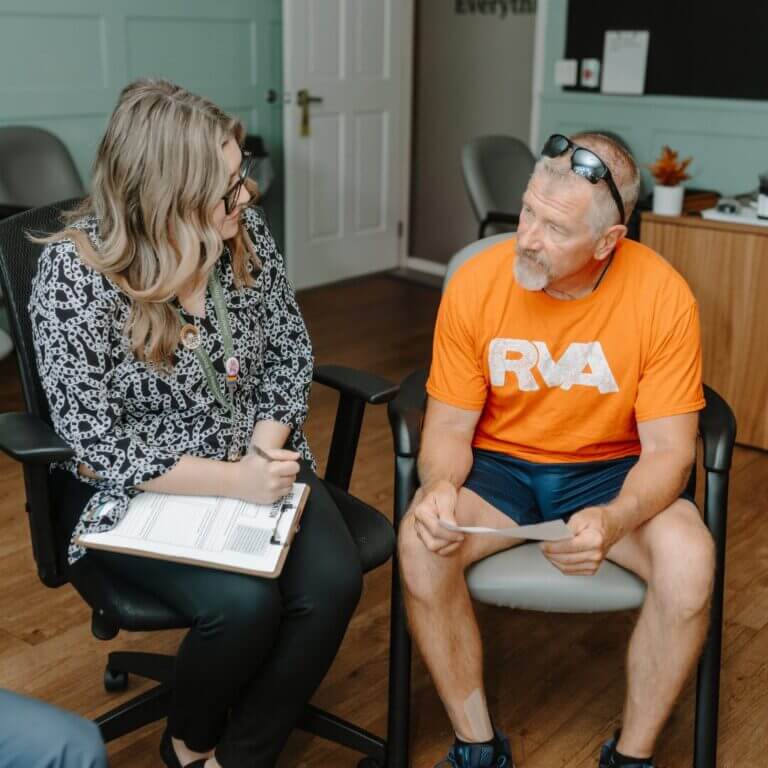Sitting in a room of strangers and discussing depression, grief, trauma, or familial problems can sound like an absolute nightmare, particularly for those with substance use disorder, who often feel separate from their fellows. If you look at the structure of a 12-Step program, you’ll see that while working individually with a sponsor is touted as an essential part of the process, individuals are also encouraged to attend regular meetings, where they can speak and process at a group level and identify with others around them. When battling issues like substance use disorder, mental health diagnoses, or the two co-occurring with each other, it’s invaluable to spend time processing in a group setting.
Why it Works
When seeking therapy, the value of individual care should not be overlooked. Individual work with a therapist often feels like the safest space to process and this allows for more honest and open discourse. When someone has regular sessions with a therapist they are able to set a more personalized pace and there is time to focus on specific issues. Group therapy is often best when it works in concert with individual therapy and it has many positive implications for a person’s overall mental wellness.
- Identification – One of the greatest gifts of individual therapy is the chance to identify with other people who share the same kind of experiences. Human beings are instinctually driven to socialize and engage with others but often feel alone in their emotionsl. When one has experienced trauma there can be shame and guilt as a result, and those feelings, while often not an accurate appraisal of the situation, keep people in a state of isolation. Healthy expression of life events offers the opportunity to identify with others that have been through similar experiences. Often group therapy is tailored to a specific topic, such as grief or childhood, so individuals can go with the confidence they will be sharing with others and relating to them in a distinct way.
- The opportunity to build trust – the term therapeutic alliance refers to building a sense of trust, empathy, and cooperation between patient and therapist. While individual therapy is an opportunity to build a single, strong therapeutic alliance, group therapy provides an opportunity to build more broad alliances. Rebellious by nature, many with substance use disorders have a difficult time listening to a single, authoritative voice. In group therapy, there is an opportunity to hear multiple voices and perspectives, with an added layer of trust, based on identification.
- Mutual support – Group therapy provides an opportunity to be comforted and held up by other people that share similar difficulties. Chronic isolators are affected by low self-worth, and those who also suffer from substance use disorders have often not allowed space in their lives to rely on others; those who had difficult or dysfunctional family structures as children might not feel as if they can trust other people to show up for them in times of need. A group therapy setting also allows space for the individual to become a source of support for others. Some became unreliable when suffering from the worst of substance use disorder and being trusted as a source of strength and support is a healing benefit of group therapy.
- Development of social and communication skills – Group therapy is an opportunity to practice or refresh social skills and the ability to communicate. The isolation that many feel most comfortable in while struggling can limit social skills over time because of the lack of human interaction. When time is spent in a group setting it can be easier to get back into the routine of communicating and building relationships with others again, opening the door to feeling comfortable doing so outside of the setting of the therapy session. It’s also an opportunity to learn how to express oneself vulnerably, speak with conviction, and gain acceptance from others.
- A broader safety net – When people struggle with substance use or mental health challenges, reaching out for help is essential so that they see others who will rise to that and assist them while they seek recovery. In the group therapy setting, a larger network of people have the potential to become part of that safety net that catches them when they are authentic about their struggles. The group, as a whole, can provide the safety needed until members feel comfortable trusting other individuals. The group provides a community for them to feel safe and accepted in. The sense of having a safety net that will accept authentic truths and be available in times of need is paramount to someone seeking recovery.
Treatment for substance use disorder or mental health should take an integrated approach to healing. Therapy is often the most effective when both a group and individual methods are used to help an individual with authentic expression, trust, and communication. The group setting can often be the first place someone feels safe being vulnerable and honest with their fellows, which are essential tools for lasting recovery.
Ashley Addiction Treatment is an innovative treatment program located on Maryland’s Chesapeake Bay. Ashley provides support for professionals seeking help with addiction. We are able to help people with co-occurring disorders and offer confidential treatment programs to meet your needs. Please reach out to us today at 800-799-4673.




